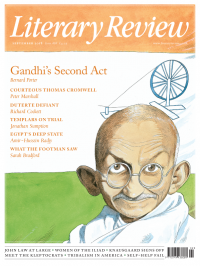Richard Canning
Fictional Treatments
The Great Believers
By Rebecca Makkai
Fleet 421pp £14.99
After the introduction in 1997 of new combination therapy drugs that began to save the lives of many (though not all) HIV patients, the genre of AIDS fiction effectively shrank, certainly among gay male writers. Long considered a commercial no-go for publishers, it also seemed now to lack an ethical imperative, since the prospects for HIV patients had improved so dramatically (the situation hadn’t changed entirely, but that’s a different story). As the epidemic itself came to be seen in historical terms, its victims too became, as the title of Felice Picano’s ambitious 1995 saga had it, ‘like people in history’.
Now, after two decades of near-dormancy in the field of AIDS fiction, three ambitious novels – all written by female American authors – have placed the plague centre stage. First came Hanya Yanagihara’s moving if overblown Booker Prize-shortlisted A Little Life (2015). This year has already seen the publication of 29-year-old Chloe Benjamin’s The Immortalists. The third and by far the most successful of the trio is Rebecca Makkai’s The Great Believers.
The novel tells two stories, counterposed throughout: that of Yale Tishman, a young, gay art gallery employee living in Chicago in the 1980s as the horror unfolds; and that of Fiona, the sister of Yale’s friend Nico, who is among the first to die, and her search in 2015 for

Sign Up to our newsletter
Receive free articles, highlights from the archive, news, details of prizes, and much more.@Lit_Review
Follow Literary Review on Twitter
Twitter Feed
How to ruin a film - a short guide by @TWHodgkinson:
Thomas W Hodgkinson - There Was No Sorcerer
Thomas W Hodgkinson: There Was No Sorcerer - Box Office Poison: Hollywood’s Story in a Century of Flops by Tim Robey
literaryreview.co.uk
How to ruin a film - a short guide by @TWHodgkinson:
Thomas W Hodgkinson - There Was No Sorcerer
Thomas W Hodgkinson: There Was No Sorcerer - Box Office Poison: Hollywood’s Story in a Century of Flops by Tim Robey
literaryreview.co.uk
Give the gift that lasts all year with a subscription to Literary Review. Save up to 35% on the cover price when you visit us at https://literaryreview.co.uk/subscribe and enter the code 'XMAS24'